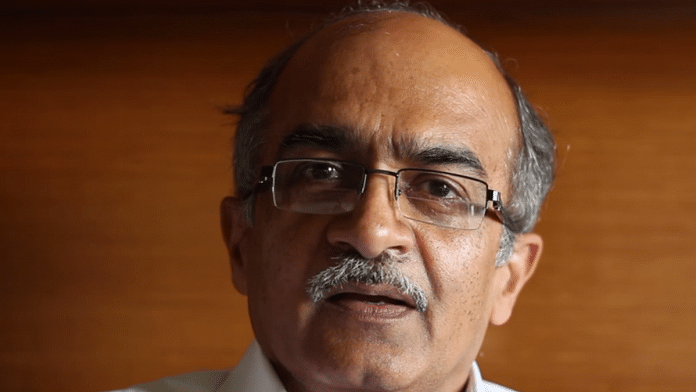New Delhi: In a fresh affidavit filed in the Supreme Court Monday, advocate Prashant Bhushan refused to apologise for two of his tweets over which the top court had on 14 August found him guilty of contempt.
“An apology cannot be a mere incantation and any apology has to, as the court has itself put it, be sincerely made. This is especially so when I have made the statements bonafide and pleaded truths with full details, which have not been dealt with by the Court,” Bhushan’s affidavit read.
It added, “If I retract a statement before this court that I otherwise believe to be true or offer an insincere apology, that in my eyes would amount to the contempt of my conscience and of an institution that I hold in highest esteem.”
The court had initiated contempt proceedings against Bhushan on 21 July for his tweets on Chief Justice of India (CJI) S.A. Bobde and former CJIs. In one of his tweets, Bhushan had commented on CJI Bobde’s photo astride a Harley Davidson bike. In the second tweet, he had criticised the incumbent and past CJIs.
While finding him guilty on 14 August, the court had noted that not dealing firmly with malicious attacks against the judiciary “may affect the national honour and prestige in the comity of nations”.
However, on 20 August, the court gave Bhushan time until 24 August to tender an unconditional apology.
“In case, an apology is submitted, the case to be posted for consideration of the same, on 25.08.2020,” it had said.
Also read: Prashant Bhushan’s refusal to apologise puts him in the same league as Gandhi and Mandela
‘Expressed myself in good faith’
During the hearing on 20 August, a bench of Justices Arun Mishra, B.R. Gavai and Krishna Murari had urged Bhushan to reconsider his fresh statement in which he reiterated that the tweets were an expression of his beliefs that were grossly misunderstood.
However, in the affidavit filed Monday, Bhushan said that while he has the “highest regard for the institution of the Supreme Court”, he had expressed himself “in good faith, not to malign the Supreme Court or any particular Chief Justice, but to offer constructive criticism so that the court can arrest any drift away from its long-standing role as a guardian of the Constitution and custodian of peoples’ rights”.
He also said “in these troubling times, the hopes of the people of India vest in this Court to ensure the rule of law and the Constitution and not an untrammeled rule of the executive”.
This, he added, “casts a duty, especially for an officer of this court like myself, to speak up, when I believe there is a deviation from its sterling record”.
The affidavit also said, “My tweets represented this bonafide belief that I continue to hold. Public expression of these beliefs was I believe, in line with my higher obligations as a citizen and a loyal officer of this court. Therefore, an apology for expression of these beliefs, conditional or unconditional, would be insincere.”
Also read: Unity is not conformity — India should know that as Prashant Bhushan is convicted for contempt




A sordid chapter in the history of Indian SC comes to an end in September first week. Given the current circumstances it won’t be surprising though if more such chapters follow.
Good Mr Prashant Bhushan. Thats how’ it should be.
I know you are only speaking of FoS and judicial reforms from a narrow perspective of lawyers. But still I believe that something is better than nothing.